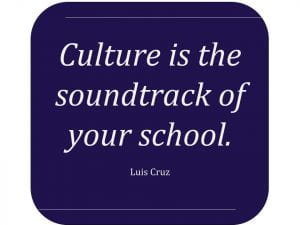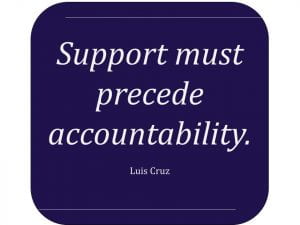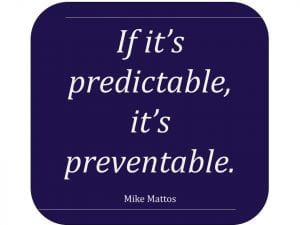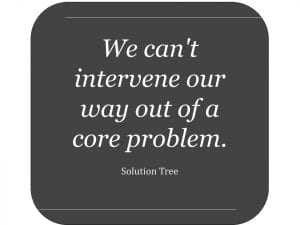Commitment to Solutions that Work
I had the amazing opportunity to attend Solution Tree’s RTI at Work Institute in Des Moines, Iowa this past week. It was just the rejuvenation I needed as the end of the school year approaches. One of my favorite things about the event was that the information presented fell in the category of “Yep, we are on the right path,” instead of where we were five years ago: “Wow, this is amazing stuff! I had never thought of this before.” Our district has been attending Solution Tree’s PLC at Work and RTI at Work Institutes for the past five years. We are committed to the process, in that every teacher, administrator, and every school board member has attended at least one of the conferences. New hires will be attending this summer or this fall. Full commitment.
Professionalism at its Best
The Solution Tree faculty is second to none. Each time I attend one of their events, I am reminded of the following characteristics that each faculty member embodies: poise, professionalism, refinement, sophistication, and clarity of purpose. They are a class act.
In Des Moines, we were treated to Luis Cruz, Nicole Dimich, Paula Maeker, and Mike Mattos. Each possesses a skill set that compliments the others. This is true of every institute put on by Solution Tree. The combined skills sets of the faculty at each institute results in powerful learning for all attendees, and makes this attendee jealous of their knowledge!
The format in which they present aligns with best teaching practices: provide relevant information, provide time for processing new information through reading, writing, and discussing it. During each keynote and breakout session, participants are engaged in the above activities, and leave each with a burning desire to put new learning right into practice.
In addition, educators are treated like true professionals: we are provided with clear handouts that accompany each section, we are provided with a filling breakfast and lunch, with a variety of options for food and drink. In addition, and it seems like a small thing, but it really is a BIG thing: we are provided with cold water bottles and hot coffee (or tea!) throughout the institute. It seems like such a small detail, but it goes a long way in making educators feel valued and important. Details matter.
A How-To Guide
The authentic work of Solution Tree’s associates in the field, implementing the practices and procedures that they talk about, speaks volumes to the efficacy of their “program.” (It’s not a program.) In the “field guide” to RTI (Response to Intervention), Taking Action, authors Austin Buffum, Mike Mattos, and Janet Malone outline the process for making the RTI process truly effective. They explain common missteps, and provide (among many other things) a means to two essential outcomes: 1) Guiding Principles that serve as a framework for the right thinking, and 2) Essential actions that transform this thinking into specific steps.
Taking Action is a “how-to” guide to effectively implementing RTI in a school system, and fully embodies the idea that there is not one way of doing things. It is rooted in taking action versus educational theory. Every school system will need to apply the principles to their own setting. The clear outline of the steps that cannot be skipped is the “glue” that holds the fidelity of the process together.
Shifts in Culture
The work required to successfully implement RTI is nothing short of difficult. It involves changing the mindsets of adults, a change that happens slowly over time with cultural change. Luis Cruz reminds us that “Culture is the soundtrack of your school!” Think about that one for a minute. It begs the question: what are we (both individually and collectively) doing to cultivate a positive culture within our school buildings? I wrote about culture in August and reflected on the following: “The question I keep coming back to is: What story am I telling to myself and others, and how is that story contributing to our overall culture?” Cultural change is much tougher than technical change, both of which are required to truly make the RTI at Work process effective.

In addition, Cruz reminds us that “Support must precede accountability.” That support comes from the establishment of a Guiding Coalition, a group of educators composed of the “right people:” those people focused on the “right work.” The work that is rooted in two assumptions: 1) All students can learn at high levels, and 2) A shared belief that the primary responsibility of each member of the organization is to ensure high levels of learning for every child.

A Fresh Look at Assessment
Nicole Dimich provided clarity around assessment when she reminded us that assessment should be viewed as evidence of learning. We also know that assessment should be used as evidence for learning: using common formative assessments to guide our instruction. Assessment goes far beyond “right” answers: it involves observation, clarity around what each priority standard means, and recognizing student strengths. Dimich encourages educators to ask how we can use assessment to motivate and improve student achievement. They key lies in the feedback we provide. If we provided timely and targeted feedback that gives students the roadmap to uncover their own missteps, we are on the path to making significant impact on student learning.
Predictability
Mike Mattos reminds us: “If it’s predictable, it’s preventable.” And soooooo much of our student actions and learning patterns are predictable. And we should not wait until fall universal screening scores come in to take action. We know our students; we have spring data; we have teams of teachers who have been working with these students. We must be proactive, starting in the spring of the school year, with putting solid plans in place to hit the ground running in the fall, so that all three tiers of instruction are in place and running like a well-oiled machine. We need to end our year with a bang and with a strong message to start the upcoming school year with a bang!

Along the lines of predictability, we were reminded again and again that “You can’t intervene your way out of a core problem.” In other words, we must have solid Tier I instruction in place, which involves having clarity around the first two of the four critical questions: 1. What do we want our students to know and be able to do? 2. How will we know when they know it? When we have absolute clarity around those two questions, we are in a position to address the final two questions (though we don’t ignore these two as we sort through the first two): 3. How will we respond when some students don’t learn? and 4. How will we extend learning for students who are already proficient? It is that third question where predictability is alive and well: no matter how solid our core instruction is, we know that some students won’t get it the first time. We can easily predict this.

The Discomfort of the Right Work
Throughout the conference, our team was reminded of the difficult work that comes with implementation of effective RTI. The biggest reminder came on the last day of the conference when we took three hours to dig into outlining the steps that are in front of us. Throughout our team’s time together, we fell into a rhythm of agreement, disagreement, high tension, and responding (mostly!) with professionalism. We were reminded that the discomfort we were feeling as we began tackling the work is a window into the discomfort we will continue to encounter as we bring our most recent take-aways back to our staff. We were reminded that we have to focus on student learning over staff comfort, convenience, or desires. Not easy, but oh-so-worth-it!